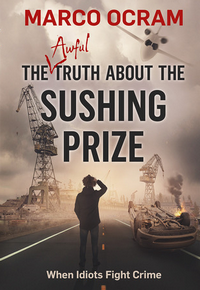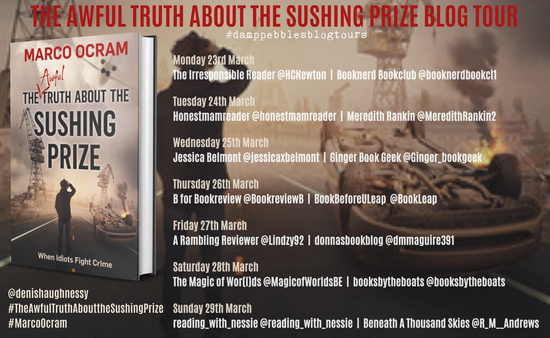 |
The Awful Truth About the Sushing Prizeby Marco Ocram Kindle Edition, 346 pg. Read: March 17-20, 2020 |

With notable exceptions—among whom I would include you, my friend—writers are the most egotistical of all humans. The desire to be published is a desire for attention. When one writer draws less attention than another they suffer a humiliating insult to their psychological ego centres.
After compiling last Saturday’s Miscellany post, and thinking about this book, I’ve decided that I really should have read The Truth About the Harry Quebert Affair by Joël Dicker before starting this one. Just what I’ve gleaned online about this book makes it seem like Denis Shaughnessy Marco Ocram was fairly influenced on it for at least the backstory and a couple of the character names for this present novel. I’m curious about how much more than that I’d have picked up if I’d read Dicker before the palindromic Ocram, but it’s not a necessary pre-requisite.
I have, however, read Mark Leyner’s Et Tu, Babe, which this novel also reminded me of. I’m pretty sure I haven’t come across anything in Crime Fiction that I could compare to Leyner before, so that’s saying something.
The Ocram that’s the narrator of The Awful Truth About the Sushing Prize, like the protagonist Leyner, is a mega-selling author and celebrity, master of multiple disciplines. One thing that Ocram can do that Leyner couldn’t* is he can shape the course of the novel—or a scene he’s in the middle of—because he’s writing his reality. Which I hope makes sense. (Think of the movie Stranger than Fiction, but Will Ferrell’s character is calling the shots).
* As I recall, anyway. It’s been a couple of decades since my last re-read.
In an attempt to get out of watching sports with his friend, the Chief of Police Como Galahad, Ocram invents a body down at the port. The two go to investigate and end up in dealing with criminals from around the globe in a scheme that defies reason (but makes a lot of sense when the details are revealed).
Most of the book is truly outlandish and implausible, but it fits this tour of absurdity better than you could imagine.
The weakness of this book comes from its strength and premise, the novel is so clever and adheres so much to the conceit that it gets in the way of telling a good story with some depth to the characters. It’s still a decent story with amusing characters—but I think if the writer had pulled back a little from his commitment to the premise it’d be a better novel. Of course, if he had, I’d probably complain about him pulling his punches. So take this with a handful of salt.
“I heard six shots. You didn’t get him with any of them?”
“No, but they think I hit his car.”
“Good shooting. Next time I need to hit a barn door from ten paces I’ll ask you along for advice.”
“It’s easy to be sarcastic, but don’t forget I’ve never used a gun before.”
“That’s true. At least you worked out which was the shooty end. Could have been messy otherwise.
The humor is sometimes as subtle as a sledgehammer attacking a watermelon. Then within a sentence or two, something will be slipped in so cleverly that I had to re-read it a couple of times to make sure that what I thought was funny was supposed to be. I generally preferred the latter, but some of the obvious jokes were so well done that I don’t want to knock the frequent lack of subtlety. I’ve gone back to this next line so many times over the last couple of days, and still chuckle at it:
He’s meant to be one of the most intelligent people in the world. An autodidact too.”
“He can spout as much about cars as he likes…
The metafictional aspect of the novel is largely used for humorous ends—although sometimes it’s a tool to progress the plot, too. Sure, sometimes it’s used for loftier ends (à la Leyner’s work), but the emphasis here is for entertainment value. Which saves it from becoming a self-indulgent, pretentious mess rather than being what it is: self-indulgent fun. Here’s a few lines (I could produce many more) as illustration:
Which left the agency driver—just as I’d suspected when I made him up.
It was the oldest plot twist in the book (so far, anyway). I wagged my head at the thought of how predictable it all was.
Back in the car park, I made a convenient continuity error and climbed into my black Range Rover, hoping my readers wouldn’t remember that I’d left it at a burnt-out warehouse three chapters ago.
There are a couple of instances where the author switches from past tense to present because the events being described are so intense. I found myself grinning while reading each time it happened. It’s a delightfully inspired choice.
I chuckled, I looked up a couple of words, I wondered about the author’s sanity and really enjoyed myself while reading this. Sure, I wanted a little more depth, a little more reason to connect with any of the characters or the story—but I knew I wasn’t supposed to. The Awful Truth About the Sushing Prize is an impressive novel, clever and amusing—and if you can embrace the absurdity behind it, you’ll be glad you read it (and you’ll probably still enjoy it if you don’t fully get on board with the absurdity, but you’ll have to work harder for it).

This post contains an affiliate link. If you purchase from it, I will get a small commission at no additional cost to you. As always, opinions are my own.
My thanks to damppebbles blog tours for the invitation to participate in this tour and the materials (including a copy of the novel) they provided.





damppebbles
Thanks so much 🙂
HCNewton
of course!